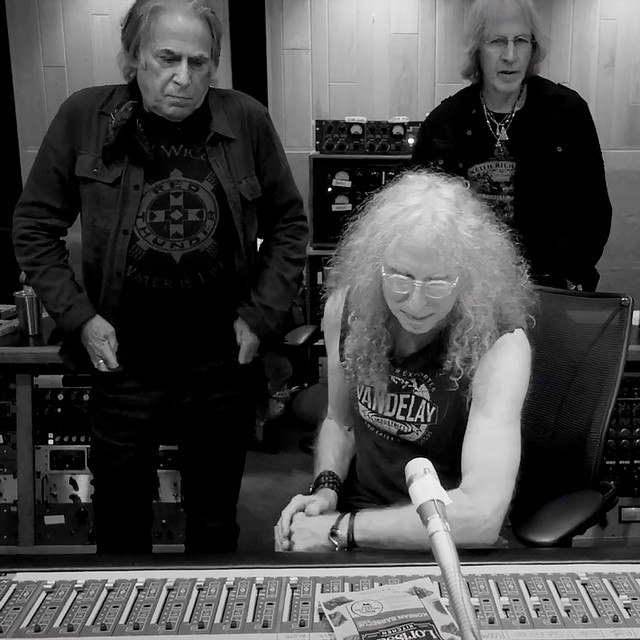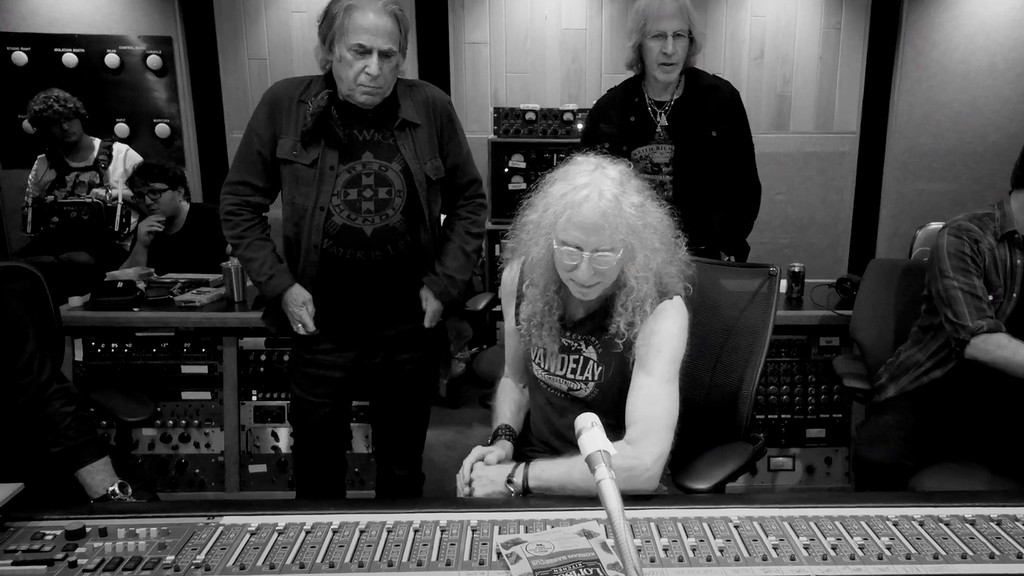As an Osher Institute instructor this spring, Bill Pike, G’83, helped arrange a screening of a documentary about session musicians behind some of the 1970’s biggest hits. Teamwork was a big theme of the film — and essential to how they pulled off the event, including a Q&A with the filmmaker. Here’s Pike’s story.
3:30 in the afternoon on Tuesday, April 8, finally arrived. That’s when the screening of the documentary Immediate Family took place in Ukrop Auditorium. It was the culmination of months of behind-the-scenes work.
The day before, on Monday afternoon, my Osher teaching partner, Joe Vanderford, drove in from Chapel Hill. Two days before, late on Sunday evening, Denny Tedesco, the creator and director of the documentary, arrived from Los Angeles. This was the second time Tedesco has been a part of an Osher class with us. For Joe and me, it was our eighth collaboration in presenting a class for UR’s Osher Lifelong Learning Institute.
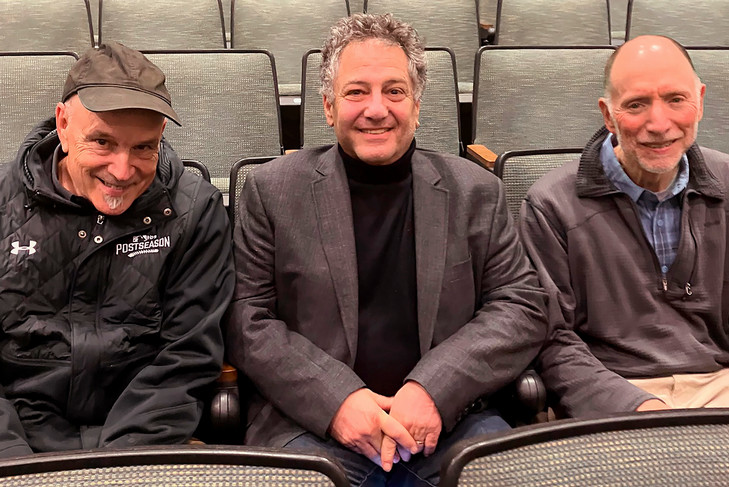
From left, Joe Vanderford, filmmaker Denny Tedesco, and Bill Pike, G’83
The Osher Institute is a continuing education hub “for students age 50 or better,” as its website says. “There are no entrance requirements, no tests, and no grades. In fact, no college background is needed at all. It’s your love of learning that counts.” Back in 2016, Joe and I created an Osher class about the Beach Boys’ influential album Pet Sounds. The day before the class, we had the good fortune of screening Tedesco’s first documentary, The Wrecking Crew, with him in attendance.
The Wrecking Crew was the collective nickname of a group of gifted studio musicians who played on Pet Sounds and hundreds of other hit records in the ’60s. These are the songs that more than a few of the participants in Osher classes grew up with.
Tedesco’s father, Tommy, was a much sought-after guitarist in that cadre of studio musicians. He and the Wrecking Crew played on some of the biggest hits of the era, including The Ronettes’ “Be My Baby,” The Righteous Brothers’ “You’ve Lost That Loving Feeling,” Sonny and Cher’s “I Got You Babe,” The Beach Boys’ “Good Vibrations,” and Frank Sinatra’s “Strangers in the Night.”
Opening the Pet Sounds class with a screening of The Wrecking Crew — with Tommy Tedesco’s son Denny, the filmmaker, there as a special guest — was a stroke of genius that was Joe’s idea.
Nine years later, we were fortunate to bring Denny Tedesco back to campus for a screening of his documentary Immediate Family, which focuses on legendary session musicians working in the 1970s. Luckily, when Joe reached out to Tedesco to pitch a return to Osher, he said yes again.
This documentary also focuses on session musicians from Los Angeles. In the ’70s, Danny Kortchmar, Leland Sklar, Russ Kunkel, and Waddy Wachtel were in the recording studios and on the road with Carole King, James Taylor, Jackson Browne, Neil Young, Linda Ronstadt, and many more singers and songwriters. Even today, their musicianship is still sought after by recording artists and their producers.
For this class, Joe and I broke our traditional template. We would not offer a post-screening session. In our previous offerings, we focused on one artist or band. With this one, there were too many artists, too many classic albums, and too many hit songs. We opted to let the documentary do the talking.
As with The Wrecking Crew, Denny Tedesco continues to be a gifted storyteller with Immediate Family. He has a way of pulling backstories from the musicians and recording artists with an ease that graciously places the audience into those settings. In those moments, Tedesco catches a range of human emotions.
The humor he reveals is priceless. In Immediate Family, we learn why these artists are like family to each other.
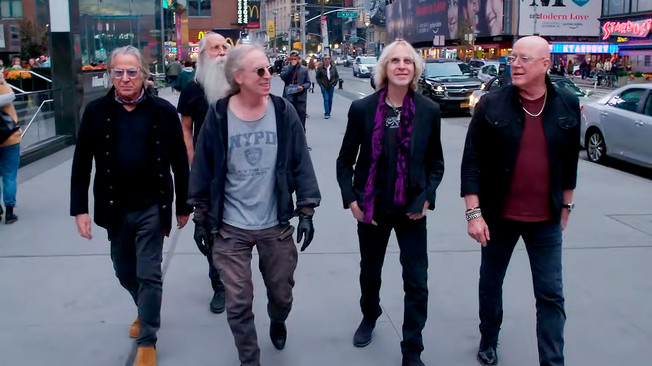
Tedesco also gives us a glimpse into the early lives of these musicians. We learn how their passion for their instruments and the music they create are formed. That passion came from the support of their families and an internal drive each musician possessed.
Clearly, these musicians have a bond and an ability to work together. That teamwork is helpful to recording artists and record producers. Not only can Kortchmar, Sklar, Kunkel, and Wachtel read each other in a session, but their experience is also beneficial to the recording artist and the producer. Most critical is their willingness to be as helpful as possible during the recording session or live concert performance. Give-and-take is valuable in a profession where egos often create challenges.
Similar teamwork was critical in the development of the class for the screening. It required an additional level of communication between us and people across the University of Richmond.
We had assistance from the School of Professional and Continuing Studies, the School of Arts & Sciences, and the film studies department. Deans, program coordinators, faculty, and others helped with everything from securing grant funding for Tedesco’s stay on campus to helping publicize it and widening the audience for his visit beyond Osher students.
On the afternoon of the screening of Immediate Family, all of the behind-the-scenes teamwork came together. From the time we picked Tedesco up at the alumni center to the end of the program, he was steady, composed, and able to answer questions and interact with everyone from the Osher staff to the Osher students. The documentary was a hit, and so was he. The audience asked interesting questions, and Tedesco, with his expertise and knowledge, provided additional insights about the documentary.
As the Q&A came to a close, we learned about his next projects. He’ll be very busy as he juggles the development of two documentaries simultaneously — one on the legendary American disc jockey Wolfman Jack and the other on the award-winning jazz vocal group The Manhattan Transfer.
“The creative input of these session guys cannot be overstated. It can’t be overstated.”
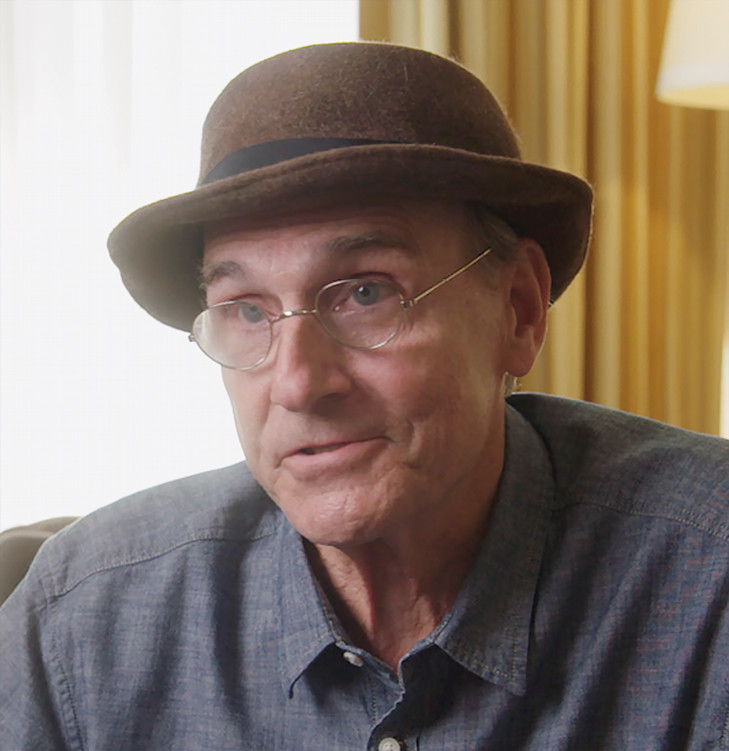
In the days ahead of us, Joe and I will debrief about our latest endeavor with Osher. For me, one of my takeaways will be about teamwork.
Teamwork is one of the subtle themes of Immediate Family. Tedesco worked tirelessly with a talented group of people to put the documentary together. That teamwork was present with Tommy Tedesco and the Wrecking Crew musicians in the ’60s, and it remained present with Kortchmar, Sklar, Kunkel, and Wachtel in their studio and concert work from the ’70s through today. They were a team dependent upon their singular and collective gifts to create one of the best things still standing in this old world — music.
To make this Osher offering a success, we also needed teamwork that went well beyond Osher. Reaching deeper into the life of the university allowed for new collaborations. Who knows what those collaborations might yield for Osher’s students and the university’s students in the future?
Another piece of teamwork comes from the support of our wives. Each year, they patiently bless our pursuit of this “brain sludge” to develop a class about the music from our youth that is seared in our old hearts.
And there is something else seared in those old hearts — people.
Maybe singer/songwriter James Taylor said it best in Immediate Family: “The creative input of these session guys cannot be overstated. It can’t be overstated.”
For Joe and me, our hearts know the teamwork of the people involved in making this Osher class happen “can’t be overstated.”
Without everyone’s teamwork and hearts, there would have been no class.
Musician images/screenshots courtesy of Denny Tedesco; image of Vanderford/Tedesco/Pike courtesy of Bill Pike
